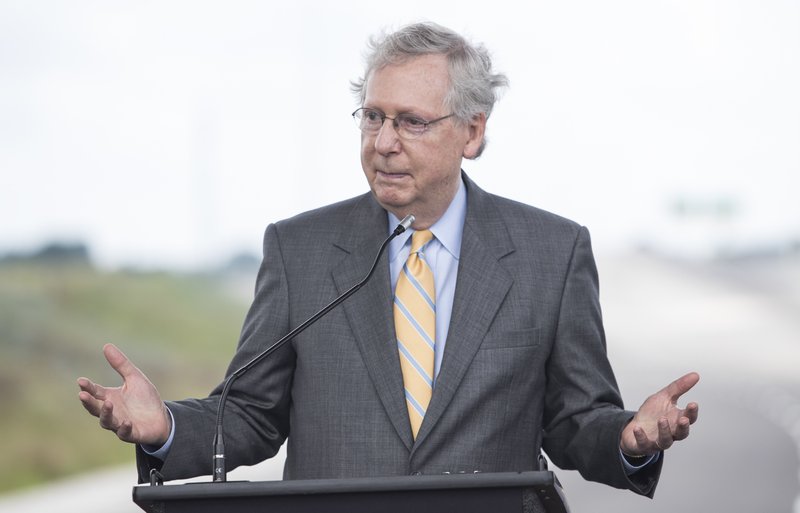GLASGOW, Ky. -- Senate Majority Leader Mitch McConnell says he plans to produce a fresh bill in about a week scuttling and replacing much of former President Barack Obama's health care law. But he also acknowledged a Plan B if that effort continues to flounder.
"If my side is unable to agree on an adequate replacement, then some kind of action with regard to the private health insurance market must occur," McConnell, R-Ky., said Thursday. It was one of his most explicit concessions that a top priority for President Donald Trump and the entire GOP, erasing much of Obama's 2010 statute, might fall short.
He gave no details during remarks he made at a Rotary Club lunch in a conservative rural area of southern Kentucky.
Previously, other Republicans have said that if their broad drive to dismantle much of Obama's law struggled, a smaller bill with quick help for insurers and consumers might be needed. They've said it could include provisions continuing federal payments to insurers that help them contain costs for some low earners and inducements to keep healthy people buying policies, a step that helps curb premiums.
[INTERACTIVE: Compare House, Senate bills with Affordable Care Act]
McConnell's comments suggested that to show progress on health care, Republicans controlling the White House and Congress might have to negotiate with Democrats. While the current, wide-ranging GOP health care bill has procedural protections against a Democratic filibuster in the Senate, a subsequent, narrower measure wouldn't and would take 60 votes to pass.
The broader repeal effort that McConnell prefers would fail if just three of the 52 Republicans vote no, since all Democrats oppose it. He canceled a vote on the measure last week after far more Republicans than that objected, and he's been spending the Independence Day recess studying changes that might win over GOP dissidents.
"We have an obligation to the American people to try and improve what we currently have. What we do know is the status quo is not sustainable," he said.
Senate Minority Leader Charles Schumer, D-N.Y., called it encouraging that McConnell had "opened the door to bipartisan solutions." He said the focus should be on continuing the federal payments to insurers, which Trump has threatened to halt.
Democrats have said they won't negotiate until Republicans abandon their repeal effort.
McConnell's comments came during a recess that has produced no visible evidence that he's winnowed the number of unhappy Republican senators. If anything, the list seemed to have grown, as Sen. John Hoeven, R-N.D., said he opposed the bill but was vague about changes he'd want.
At least a dozen GOP senators have publicly opposed or criticized the legislation.
Republicans have said Obama's law is failing, citing markets around the country where insurers have pulled out or sharply boosted premiums. Some areas are down to a single insurer.
Democrats acknowledge Obama's law needs changes that would help curb the growth of health care costs. But they say the GOP is exaggerating the problem and note that several insurers have attributed their decisions to stop selling policies in unprofitable areas, in part, to Trump administration indications that it may halt payments to insurers.
In its report last week on the Senate bill, the nonpartisan Congressional Budget Office said that under Obama's law, it expected health care markets "to be stable in most areas."
It said the same about the Senate legislation. But it also said under the GOP bill, 22 million more Americans would be uninsured because it would eliminate Obama's tax penalty on people who don't buy coverage and it would cut Medicaid, the health insurance program for the poor, disabled and many nursing home patients.
Sen. Ted Cruz, R-Texas, said Thursday on San Antonio's KTSA Radio that the GOP's Senate majority "is so narrow, I don't know if we can get it done or not."
Dozens of protesters were arrested nationwide after occupying the local offices of Republican senators, a protest against the Better Care Reconciliation Act organized by a coalition of leftist groups.
The protests took place in Arizona, Arkansas, Florida, Kentucky, Louisiana, Missouri, Ohio and Wisconsin, with slightly different missions. They were organized by chapters of Democratic Socialists of America, Socialist Alternative, Indivisible, Our Revolution and the Working Families Party.
In some cities, like Denver's protest of Sen. Cory Gardner, R-Colo., and Phoenix's protest of Sen. Jeff Flake, R-Ariz., activists refused to leave and were detained by police. No one was arrested at the protests in Arkansas.
In Ohio, activists found themselves able to stay overnight in the offices of Sen. Rob Portman, R-Ohio.
By midday Friday, many of the protesters were still camped out at Portman's offices, suggesting they might leave only if he held a town-hall-style meeting.
Information for this article was contributed by Bruce Schreiner, Alan Fram, Marc Levy and John Hanna of The Associated Press; and by David Weigel of The Washington Post.
A Section on 07/08/2017
